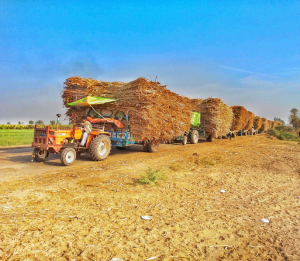The Agriculture sector uninterrupted engages in recreation of Pakistanis economy since independence. In the early time, it considered a dominant sector but due to the declining its performance due to the political, social, environmental and climate conditions its production yield goes down gradually and now it is the second largest sector in Pakistan.

It accounting for over 21 percent of GDP, 45 percent of total labor force engaged with this sector. Around 63 percent of country population live in rural areas is indirectly or directly linked with this sector for their livelihood. Agriculture sector have Strong linkage with the rest of the economy that is unnoticed in statistics.
While on the Other hand, it is the primary supplier of raw materials to downstream industry, that contributing significantly to Pakistan’s export; it is the largest market for industrial manufactured goods such as pesticides, fertilizers, tractors and agriculture equipment’s.
Predictor variable comprises five sub-sectors include Major, Minor crops, livestock’s, fisheries and forestry. Major crops consist of cotton, rice, wheat and sugarcane etc. and contribute 6.5% solely to the GDP. Cotton is the main non-food crop that is used as a raw material for the textile industry. Pakistan is the fourth largest producer of cotton.
Rice and Wheat are the major food crop out of which rice is also one of the main export items of the country. Sugarcane is another important crop grown for sugar and sugar related products. Minor crops consist of oil seeds, vegetables, pulses, chilies and other small crops. Oil seed crops include cottonseeds, rapeseed/mustard, sunflower and canola etc.
Role of Agriculture in Economic Development
Agriculture have great role in economic development and prosperity. Following are some important contributions of agriculture as;
- Contribution to National Income
- Source of Food Supply
- Pre-Requisite for Raw Material
- Provision of Surplus
- Shift of Manpower:
- Creation of Infrastructure:
- Relief from Shortage of Capital:
- Helpful to Reduce Inequality
- Based on Democratic Notions
- Create Effective Demand
- Helpful in Phasing out Economic Depression:
- Source of Foreign Exchange for the Country
- Contribution to Capital Formation:
- Employment Opportunities for Rural People:
- Extension of Market for Industrial Output
Role of Agriculture in GDP of Pakistan
Current GDP of Pakistan is 305 billion. Contribution of major crops in agriculture sector is about to be 25.6 % and contribution of major crops in GDP is almost 5.4% according to the economic survey of Pakistan. Wheat contributes approximately 10.3% in agriculture. Sugarcane is also a cash crop and food crop.
Agriculture accounts for 18.9 % of GDP and employed bulk of the total work force. Agriculture sector recorded a growth of 3.46 percent in FY 2017 as compared to the growth of 0.27 percent last year. The crops sub sector comprises of 37.22 percent of agriculture sector and is the basic driver of growth of the agriculture sector as well as GDP.
Problems in Agriculture of Pakistan
Agriculture is the backbone of Pakistan’s economic and facing a cyclones of problems in Pakistan as;
- Lack of Modern Agriculture technology
- Poor Financial Position of Farmer
- Limited Cultivable Area
- Waterlogging and salinity
- Slow Growth of Allied Product
- Low per Hectare Yield
- Inadequate Infrastructure
- Uneconomic Land holdings
- Old method of Production
- Inadequate supply of Agriculture Inputs
- Lack of irrigation Facilities
- Inadequate Agriculture Research Center
- Problem of Land Reforms
- Defective Land Reforms
- Subsistence Farming
- Low Cropping intensity
- Improper Crop Rotation
- Various Plant diseases and Natural Calamities

Adaptive Research Farm, Rahim yar Khan